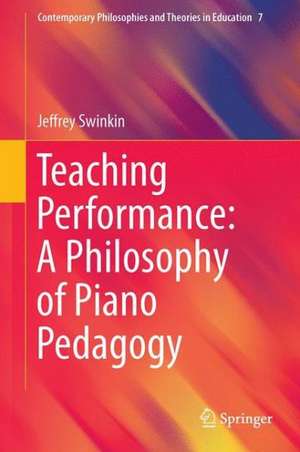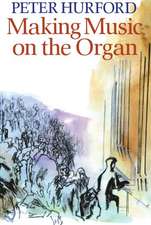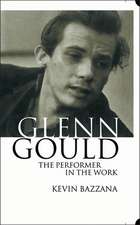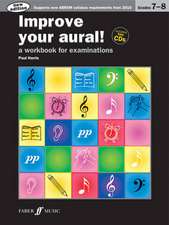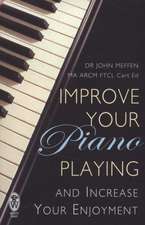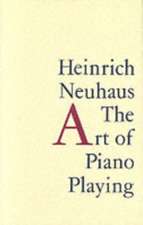Teaching Performance: A Philosophy of Piano Pedagogy: Contemporary Philosophies and Theories in Education, cartea 7
Autor Jeffrey Swinkinen Limba Engleză Hardback – 27 iul 2015
The architects of absolute music (Hanslick, Schopenhauer, and others) held that it is precisely because instrumental music lacks language and thus any overt connection to the non-musical world that it is able to expose essential elements of that world. More particularly, for these philosophers, it is the density of musical structure—the intricate interplay among purely musical elements—that allows music to capture the essences behind appearances. By analogy, the author contends that the more structurally intricate and aesthetically nuanced a pedagogical system is, the greater its ability to illuminate music and facilitate musical skills. The author terms this phenomenon relational autonomy. Eight chapters unfold a piano-pedagogical system pivoting on the principle of relational autonomy. In grounding piano pedagogy in the aesthetics of absolute music, each domain works on the other. On the one hand, Romantic aesthetics affords pedagogy a source of artistic value in its own right. On the other hand, pedagogy concretizes Romantic aesthetics, deflating its transcendental pretentions and showing the dichotomy of absolute/utilitarian to be specious.
| Toate formatele și edițiile | Preț | Express |
|---|---|---|
| Paperback (1) | 385.62 lei 6-8 săpt. | |
| Springer International Publishing – 15 oct 2016 | 385.62 lei 6-8 săpt. | |
| Hardback (1) | 392.97 lei 6-8 săpt. | |
| Springer International Publishing – 27 iul 2015 | 392.97 lei 6-8 săpt. |
Din seria Contemporary Philosophies and Theories in Education
- 24%
 Preț: 631.29 lei
Preț: 631.29 lei - 15%
 Preț: 638.11 lei
Preț: 638.11 lei -
 Preț: 385.25 lei
Preț: 385.25 lei -
 Preț: 481.05 lei
Preț: 481.05 lei - 15%
 Preț: 523.54 lei
Preț: 523.54 lei -
 Preț: 380.84 lei
Preț: 380.84 lei - 18%
 Preț: 880.25 lei
Preț: 880.25 lei - 15%
 Preț: 637.28 lei
Preț: 637.28 lei - 15%
 Preț: 640.55 lei
Preț: 640.55 lei - 15%
 Preț: 635.47 lei
Preț: 635.47 lei - 18%
 Preț: 721.63 lei
Preț: 721.63 lei - 18%
 Preț: 885.95 lei
Preț: 885.95 lei - 18%
 Preț: 775.30 lei
Preț: 775.30 lei - 15%
 Preț: 633.68 lei
Preț: 633.68 lei - 15%
 Preț: 634.68 lei
Preț: 634.68 lei - 15%
 Preț: 635.96 lei
Preț: 635.96 lei - 18%
 Preț: 730.65 lei
Preț: 730.65 lei -
 Preț: 393.52 lei
Preț: 393.52 lei - 15%
 Preț: 645.28 lei
Preț: 645.28 lei
Preț: 392.97 lei
Nou
Puncte Express: 589
Preț estimativ în valută:
75.20€ • 78.22$ • 62.09£
75.20€ • 78.22$ • 62.09£
Carte tipărită la comandă
Livrare economică 15-29 aprilie
Preluare comenzi: 021 569.72.76
Specificații
ISBN-13: 9783319125138
ISBN-10: 3319125133
Pagini: 241
Ilustrații: XXI, 229 p. 58 illus., 8 illus. in color.
Dimensiuni: 155 x 235 x 20 mm
Greutate: 0.53 kg
Ediția:1st ed. 2015
Editura: Springer International Publishing
Colecția Springer
Seria Contemporary Philosophies and Theories in Education
Locul publicării:Cham, Switzerland
ISBN-10: 3319125133
Pagini: 241
Ilustrații: XXI, 229 p. 58 illus., 8 illus. in color.
Dimensiuni: 155 x 235 x 20 mm
Greutate: 0.53 kg
Ediția:1st ed. 2015
Editura: Springer International Publishing
Colecția Springer
Seria Contemporary Philosophies and Theories in Education
Locul publicării:Cham, Switzerland
Public țintă
ResearchCuprins
Acknowledgments.- Preface.- 1. Introduction.- PART 1. Aesthetic Ideology.- PART 2. Methodology.- PART 3. Praxis.- 8. Conclusion: Pedagogy as Art.- Index.
Textul de pe ultima copertă
How can the studio teacher teach a lesson so as to instill refined artistic sensibilities, ones often thought to elude language? How can the applied lesson be a form of aesthetic education? How can teaching performance be an artistic endeavor in its own right? These are some of the questions Teaching Performance attempts to answer, drawing on the author's several decades of experience as a studio teacher and music scholar.
The architects of absolute music (Hanslick, Schopenhauer, and others) held that it is precisely because instrumental music lacks language and thus any overt connection to the non-musical world that it is able to expose essential elements of that world. More particularly, for these philosophers, it is the density of musical structure—the intricate interplay among purely musical elements—that allows music to capture the essences behind appearances. By analogy, the author contends that the more structurally intricate and aesthetically nuanced a pedagogical system is, the greater its ability to illuminate music and facilitate musical skills. The author terms this phenomenon relational autonomy. Eight chapters unfold a piano-pedagogical system pivoting on the principle of relational autonomy. In grounding piano pedagogy in the aesthetics of absolute music, each domain works on the other. On the one hand, Romantic aesthetics affords pedagogy a source of artistic value in its own right. On the other hand, pedagogy concretizes Romantic aesthetics, deflating its transcendental pretentions and showing the dichotomy of absolute/utilitarian to be specious.
The architects of absolute music (Hanslick, Schopenhauer, and others) held that it is precisely because instrumental music lacks language and thus any overt connection to the non-musical world that it is able to expose essential elements of that world. More particularly, for these philosophers, it is the density of musical structure—the intricate interplay among purely musical elements—that allows music to capture the essences behind appearances. By analogy, the author contends that the more structurally intricate and aesthetically nuanced a pedagogical system is, the greater its ability to illuminate music and facilitate musical skills. The author terms this phenomenon relational autonomy. Eight chapters unfold a piano-pedagogical system pivoting on the principle of relational autonomy. In grounding piano pedagogy in the aesthetics of absolute music, each domain works on the other. On the one hand, Romantic aesthetics affords pedagogy a source of artistic value in its own right. On the other hand, pedagogy concretizes Romantic aesthetics, deflating its transcendental pretentions and showing the dichotomy of absolute/utilitarian to be specious.
Caracteristici
First full-fledged philosophical theory of performance pedagogy Grounds pedagogy in the disciplines of music theory and analysis, music philosophy, and historical musicology Narrows the gap between the speculative bias of studies in philosophy of music and the empirical bias of most studies in music education While addressing specifically pianistic issues, the ideas presented apply to the pedagogy of any instrument Includes supplementary material: sn.pub/extras
